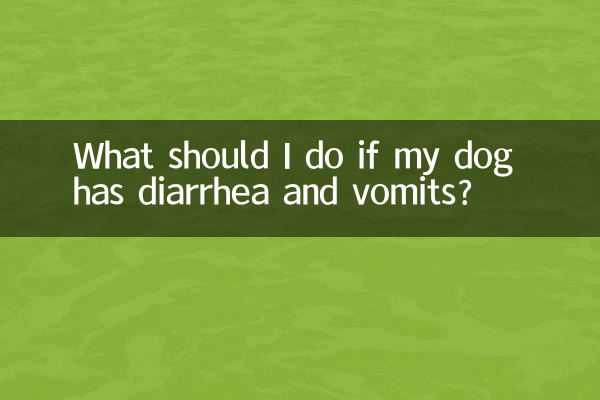What should I do if my dog has diarrhea and vomits?
In the past 10 days, the topic of pet health has continued to be popular on major social platforms and forums, especially the problem of dog diarrhea and vomiting, which has become the focus of many pet owners. This article will combine popular discussions on the Internet and veterinary advice to provide a detailed solution for poop scrapers.
1. Common causes of diarrhea and vomiting in dogs

According to recent hot topics and analysis by veterinary experts, the main causes of diarrhea and vomiting in dogs include the following categories:
| Reason type | Specific performance | Proportion (recent discussion hotness) |
|---|---|---|
| dietary problems | Accidentally eating spoiled food, sudden food changes, food allergies | 45% |
| parasitic infection | Intestinal parasites such as roundworms and tapeworms | 25% |
| viral infection | Parvovirus, canine distemper, etc. | 15% |
| stress response | Environmental changes, fright, etc. | 10% |
| other reasons | Poisoning, gastroenteritis, etc. | 5% |
2. Emergency measures
According to recent sharings from pet bloggers and veterinarian advice, if your dog has diarrhea and vomiting, you can take the following emergency measures:
1.Fast for 6-8 hours: Give your stomach and intestines a full rest, but make sure you drink enough water.
2.Feed easily digestible food in small amounts: After fasting, you can feed a small amount of white porridge, chicken breast and other low-fat foods.
3.Supplement electrolytes: You can purchase special electrolyte water for pets to prevent dehydration.
4.Watch for symptoms: Record the frequency, color, characteristics and other information of vomiting and diarrhea to facilitate description when seeking medical treatment.
3. When you need immediate medical attention
According to the recent hot discussion, you need to go to the hospital immediately if the following situations occur:
| Danger symptoms | Possible reasons | Urgency |
|---|---|---|
| Frequent vomiting (more than 5 times a day) | Poisoning, intestinal obstruction, etc. | ★★★★★ |
| Bloody or black tarry stools | gastrointestinal bleeding | ★★★★★ |
| Not eating for more than 24 hours | serious infection or other illness | ★★★★ |
| Accompanied by high fever (body temperature exceeding 39.5°C) | viral infection | ★★★★★ |
| Obvious abdominal pain | Pancreatitis etc. | ★★★★ |
4. Preventive measures
Based on recent popular pet-raising advice, you need to pay attention to the following points to prevent gastrointestinal problems in dogs:
1.Scientific feeding: Regularly and quantitatively, avoid feeding humans high-oil and high-salt food.
2.Regular deworming: Do internal and external deworming according to veterinary recommendations.
3.Keep the environment hygienic: Disinfect tableware regularly and clean the living environment.
4.avoid stress: Pay attention to comfort when going out and avoid sudden environmental changes.
5.moderate exercise: Ensure moderate exercise every day to enhance immunity.
5. Recent hot topics
According to the Internet popularity in the past 10 days, the following topics are closely related to dog gastrointestinal health:
1. "Spring Pet Gastrointestinal Care Guide" - read more than 2 million times
2. "Can dogs eat probiotics?" - Discussion thread with over 5,000 replies
3. "These home-cooked foods could kill your dog" - Video views exceeded one million
4. "Is pet medical insurance worth buying?" - a new hot topic
5. "Is AI smart diagnosis pet reliable?" - triggering widespread discussion
6. Summary
Although diarrhea and vomiting are common problems in dogs, as responsible pet owners, we need to learn to prioritize. You can ensure your pet's health by observing symptoms, taking appropriate measures, and seeking prompt medical attention when necessary. It is recommended to bookmark this article and regularly pay attention to the latest pet health information to provide better care for dogs.

check the details

check the details